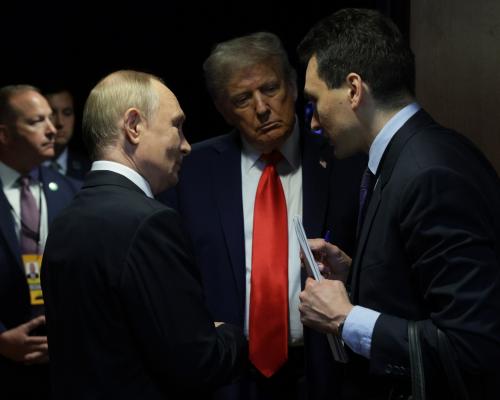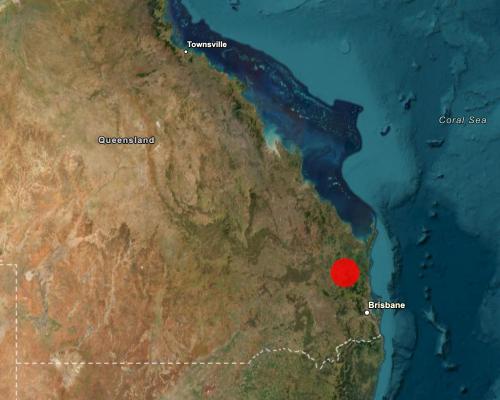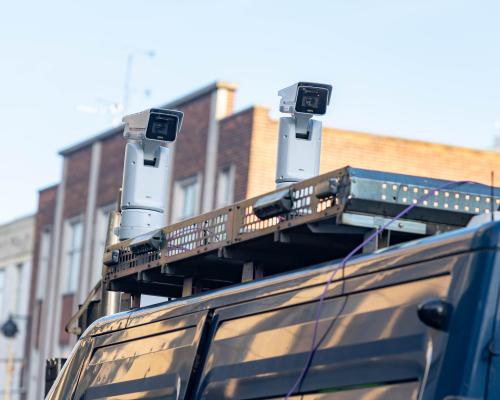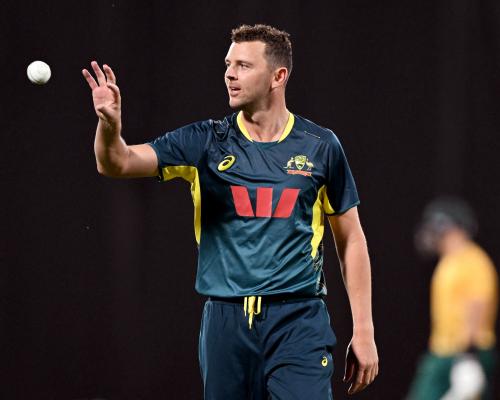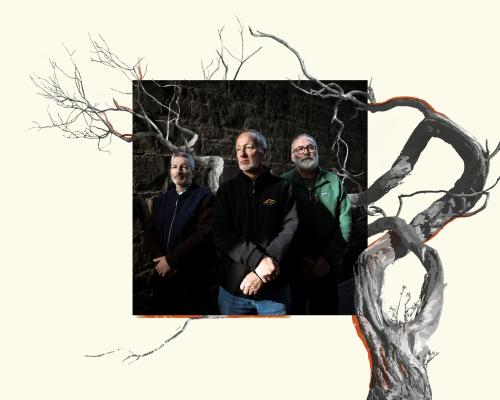
Warning: This article contains historical records that use racist and offensive language, and descriptions of events that will be distressing to some readers. It also contains references to Indigenous Australians who have died
Malcolm McKinnon remembers poking around under Great-Uncle Bill’s big old house in Brisbane while the adults were having afternoon tea. Once he found a pile of rusty old chains. Some had big loops, one was a breastplate of some kind. He thought they looked strange.
Malcolm’s brother Ross, 62, also remembers seeing the chains under Bill’s old Queenslander. “They were too big to be handcuffs,” Ross says, “but as kids we didn’t think about it any more than that.”
The boys grew up hearing about how Bill had been a famous police officer on the frontier in the Northern Territory.
“Bill was seen in the family as a bit of a legend,” Malcolm, now 69, says. “He was involved in the Petrov affair, he was active during Cyclone Tracy, he was the last cop who rode a camel.”
Much later, they realised there was another side to the story.
The chains had been for capturing and imprisoning Aboriginal people. By the neck.
A fuller picture of Constable Bill McKinnon’s policing career has emerged – and it has been confronting, revelatory and life-changing for Malcolm, Ross and their youngest brother, Alistair.
In 1934 McKinnon shot and killed an Aboriginal man named Yukun at Uluru. He told an inquiry it was accidental and he was exonerated but almost 80 years later it emerged – via the discovery of his diary – that he had indeed “fired to hit” Yukun.
He is not the only one to have concealed his actions from scrutiny. Guardian Australia has uncovered the diary of a Western Australian colonist called Major Logue who used a Masonic code to write about the killings of at least 19 Aboriginal people around Geraldton between 1851 and 1853.
These exploits were written about by the colonists themselves, which makes it difficult for descendants and their extended families to dismiss them. Yet some still have concerns about publicising these records. Logue’s diaries are being prepared for publication but the historian who has worked on them told Guardian Australia the coded entries are being deliberately left out, according to the preference of the direct descendant who holds the originals.
Sign up: AU Breaking News email
“To protect the person who holds the diaries we felt it was … expedient, perhaps, to not have that in writing. Everyone knows they did it,” Nan Broad says. “But there’s nothing in writing, and we prefer nothing to be in writing.”
Theona Councillor, who says she and Naaguja Yamatji families represent the “other side of the shield”, believes truth has a way of making itself known.
“Truth will always uncover itself,” she says. “It wants to come out. And that blood needs to be heard. That blood is calling out, the blood of my people.
“It happened 170 years ago but it feels like yesterday for me. And the way that people are hiding their records, it feels like yesterday for them too, by the sounds of it.”
Truth is vital for healing, she says, to allow Naaguja Yamatji and settler descendants to come together for the first time as equals and confront their bloody history with honesty.
Only then can the scales of denial begin to fall. “Go back to the beginning, and be brave,” she says. “We are not a nation of weaklings. We can handle the truth.”
Colonial silence
In 2018 Guardian Australia’s series documenting the frontier violence of Australia’s colonial past, The Killing Times, revealed a confronting picture of the scale of the massacres – and the involvement of government forces in an overwhelming number of them. As part of that series we brought together families grappling with their “side” of that history, some of them meeting for the first time.
The Descendants builds on that foundation. Families from over Australia are coming to terms in different ways with the real-life challenges of truth telling. For them, this work is real, personal and local. There are no guidelines. Uncovering the truth comes with the risk of family estrangement. It can lead to denial and indifference. It can also be a liberation.
Some descendants of perpetrator families are challenging what they call “colonial silence”.
In Geraldton Bruce Baskerville, a historian and descendant of the Criddle family who took part in the Bootenal massacre of 1854, talks about accepting that he has an ancestor who was a “cog in the machinery of imperial governance” – and that he has materially benefited from the dispossession of others.
“I know that I’m a beneficiary of all of that,” he says. “My life, all the food I’ve ever eaten, that’s been grown here, the education that I had, all of that’s all been paid for, from that. That’s how that wealth was created.”
George Criddle, who has spent years working between colonist and Yamatji families to break the silence, says settler families have to “unlearn” their understanding of history: “There’s a lot of entrenched ideas about who tells the story, and there’s a lot of white families who believe they are the storytellers, and that their side of the truth is the right side.”
Prof Mark McKenna, another historian, spent years investigating the shooting of Yukun for his book Return to Uluru.
Yukun endured further indignity after death. The 1935 board of inquiry exhumed his remains and took them to Adelaide.
Prompted by McKenna’s book, a forensic search was made for them but only Yukun’s skull could be located, in the South Australian Museum, in 2019. He was laid to rest in a deep, narrow grave in 2022. A small cross marks the spot near the Mutitjulu waterhole.
Ross, Alistair and Alistair’s wife, Ruth, went to Uluru for the repatriation. They stood quietly to one side of the ceremony, unsure how they’d be received. But they were welcomed, literally embraced. It felt like a family funeral.
“It was a privilege to be there,” Ross says.
The brothers have met in Melbourne on a blustery winter day to talk about their family legacy.
Alistair says their parents would have been proud of them for representing the McKinnons. Their parents believed in the importance of public service, of doing right by others.
“It was incredibly enriching,” Alistair says. To other families who might be fearing facing up to the actions of their ancestors, he says: “Embrace it. Do it.”
“The experience was so life-changing, and when we saw how much it meant to the families on the other side … we left welcomed, and it was so important to them, for us to be involved.”
Ross says he’s not convinced by the argument that men like his uncle Bill were “of their time”.
“These people did not live by the standards of their time either,” he says. “The actions at Uluru were not a one-off. They were known for being cruel. They knew what they were doing was wrong.”
McKenna says facing the truth of colonisation means understanding it still having real effects on Aboriginal people today.
“It’s not something that’s in the distant colonial past. It’s not something that is separated from us by time or by flesh or by country. It’s present now, and I think that’s still something that non-Indigenous Australians struggle to understand.”
In the case of Yukun, it led to his remains finally being found and laid to rest.
McKenna recalls looking at the “shelves and shelves of boxes” of Indigenous human remains “which literally tower over you” at the South Australian Museum.
“To see Yukun’s remains [there] and then to watch them come back to country, and see hundreds of people gathered there at Mutitjulu – it’s not history,” he says. “It’s understanding that First Nations people have to live with this today, the consequences of colonisation and the consequences of all of the racist policies that have been mounted against them over the years.”
Councillor says Aboriginal people are waiting for others to put down their “comfortable untruth” and reckon with what happened.
“Answer that blood properly,” she says. “Give my ancestors that time, that place, that voice that needs to be. You can’t just brush over a quick sorry and then it’s finished. It’s just the beginning of a reconciliation.”
• Indigenous Australians can call 13YARN on 13 92 76 for information and crisis support; or call Lifeline on 13 11 14, Mensline on 1300 789 978 or Beyond Blue on 1300 22 4636
• Lorena Allam is a professor at the Jumbunna Institute for Indigenous research at the University of Technology Sydney


